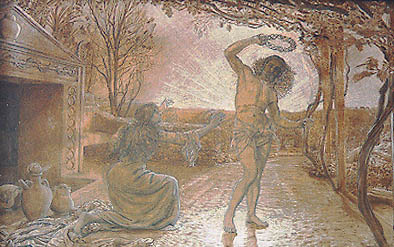|
Like most of the participants in the contemporary 'Jesus'
publishing industry, John Dominic Crossan is an enthusiast for his own,
newly-minted 'Jesus.' But, as with the others, his 'Jesus' has been eviscerated
down to a mere sliver of the original, reduced to no more than a
symbol of anti-imperialism: "I do not accept the divine conception
of either Jesus or Augustus as factual history, but I believe
that God is incarnate in the Jewish peasant poverty of Jesus and not
in the Roman imperial power of Augustus." (John Dominic Crossan,
The Birth of Christianity, p. 29). And in case you were wondering,
America is the Rome of the present day. Alas, 'poverty' isn't much of a
god, as gods go.

Inerrancy
The only aspect of the five points as stated by this author which is not
directly taught by scripture is 'inerrancy,' which is not a Bible word.
The Bible says that God's words are "pure:"
"The words of the LORD are pure words: as silver tried in a furnace of earth, purified seven times."
(Psalm 12:6).
"Every word of God is pure: he is a shield unto them that put their trust in him."
(Proverbs 30:5).
'Pure' means "Free from all heterogeneous or extraneous matter, especially
from anything that impairs or pollutes. . ." (Webster's International).
It is a reasonable inference from the Bible's stated 'purity' that it teaches
no error, because the function of scripture is to teach sinners the truth:
"Lead me in thy truth, and teach me: for thou art the God of my salvation; on thee do I wait all the day. . .Good and upright is the LORD: therefore will he teach sinners in the way. The meek will he guide in judgment: and the meek will he teach his way. All the paths of the LORD are mercy and truth unto such as keep his covenant and his testimonies."
(Psalm 25:5-10).
Any doctrinal error, such as the polytheism liberal Bible commentators
impose upon the Psalms, is 'heterogeneous matter' 'impair[ing]' scripture's
ability to achieve its stated goal:
"The law of the LORD is perfect, converting the soul: the testimony
of the LORD is sure, making wise the simple." (Psalm 19:7).
The intended goal of scripture is to provide adequate grounds for belief:
"And truly Jesus did many other signs in the presence of His disciples, which are not written in this book;
but these are written that you may believe that Jesus is the Christ, the Son of God, and that believing you may have life in His name."
(John 20:30-31).
Certainly what God set out to do He has accomplished: "God is an
author in whose works you will find no myth or fiction, but truth's
inexorable rules all observed as though graven on stone."
(Philo Judaeus, The Worse Attacks the Better, Chapter XXXIII, Loeb edition
p. 285). Through the nineteenth century, the Roman Catholic Church
itself held that scripture is without error:
"But it is absolutely wrong and forbidden, either to narrow inspiration
to certain parts only of Holy Scripture, or to admit that the sacred writer has erred.
For the system of those who, in order to rid themselves of these difficulties, do not
hesitate to concede that divine inspiration regards the things of faith and morals,
and nothing beyond, because (as they wrongly think) in a question of the truth or falsehood
of a passage, we should consider not so much what God has said as the reason and purpose
which He had in mind in saying it — this system cannot be tolerated. For all the books which
the Church receives as sacred and canonical, are written wholly and entirely, with all their
parts, at the dictation of the Holy Ghost; and so far is it from being possible that any
error can co-exist with inspiration, that inspiration not only is essentially incompatible
with error, but excludes and rejects it as absolutely and necessarily as it is impossible
that God Himself, the supreme Truth, can utter that which is not true."
(Pope Leo XIII, November 18, 1893, Encyclical Providentissimus Deus – On
the Study of Holy Scripture.)
They should have stuck to their original position because it is better than
the confusion where they have now arrived.

|


